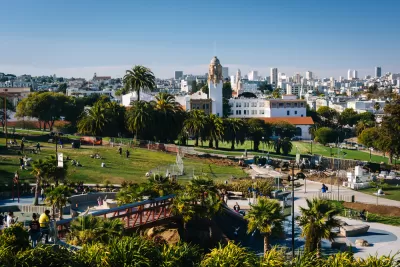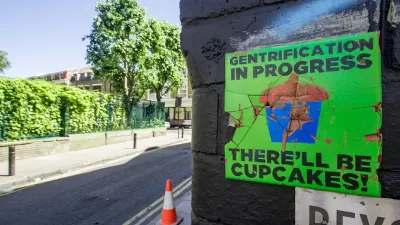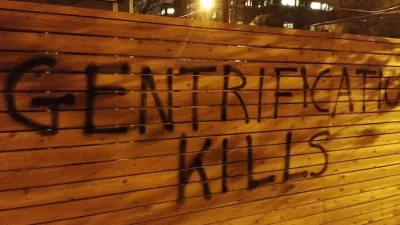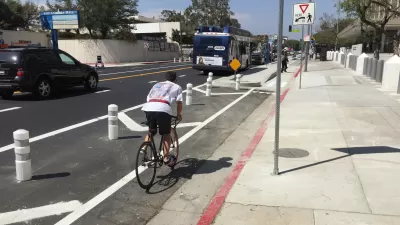Zócalo Public Square Editor Joe Mathews takes aim at the phrase, “We want to protect the character of the community," calling it a lousy argument in normal times and verging on "treasonous" due to climate change and California's housing crisis.

"The expressed desire to defend community character is a staple of California conversations," writes Mathews.
It’s routinely aimed at developers, planners or anyone with a big, transformational vision. But in a state struggling to keep up with changes in housing, economy and environment, there may be no more damaging set of words.
Planetizen has no tag for "community character," but has 22 posts tagged "neighborhood character." What's intriguing about Mathews' column is his observation that "protecting community character" is used by a wide array of interests.
The defense is most often, but not exclusively, expressed by homeowners and their groups to oppose housing projects that add unwanted density, even if not in their own single-family neighborhoods, as New York Times "Upshot" columnist Emily Badger reported last January (via Planetizen, "The Rise of the NIMBY Movement, and How Homeowners Came to Own the Whole Neighborhood"):
Common among these opposition campaigns is a conviction "that owning a parcel of land gives them a right to shape the world beyond its boundaries," according to Badger, who traces the roots of the idea that the influence of property owners should reach well beyond the property line.
It is also "used by poor people protesting gentrification that might bring richer people to their neighborhoods," observes Mathews, although he doesn't provide examples.
The proposed residential building moratorium in the gentrifying Mission District of San Francisco in 2015 comes to mind, meant to prevent displacement in the largely Latino neighborhood. Many residents want the moratorium campaign extended to bikeshare stations, which have "recently become a source of scorn from anti-gentrification advocates."
Mathews doesn't take on historical and cultural applications of protecting neighborhood character, although it's difficult to think why he would make them an exception.
Beyond housing
"As bad as today’s housing crisis is, it pales in comparison to the dangers that the community protection racket poses for California’s future," adds Mathews.
The threat of climate change, in particular, will require transformation in how and where we live, which by definition will change community character. And the state needs to invest on an enormous scale in transit so that we drive less and burn fewer fossil fuels. No responsible community in California should stay the same in such a time.
Proposition 13
For 40 years now, since the passage of Proposition 13, California has prioritized community stability — holding down property taxes to benefit existing homeowners and businesses — at the expense of schools, health care, business development and local services. It’s time for that era to end.
But that will require that we stop singing the praises of community character and start realizing that it’s really the anthem of California’s religion of obstruction.
Mathews began his passionate column by asking readers to adopt a New Year's resolution: "[F]or the good of your state, the best thing you could do is swear off this phrase: 'We want to protect the character of the community,'" and ends with:
And if your fellow Californians still persist in claiming they want to “protect the character of our community,” please feel free to start questioning their character.
FULL STORY: Resistance to development stands in way of prosperity

Planetizen Federal Action Tracker
A weekly monitor of how Trump’s orders and actions are impacting planners and planning in America.

Maui's Vacation Rental Debate Turns Ugly
Verbal attacks, misinformation campaigns and fistfights plague a high-stakes debate to convert thousands of vacation rentals into long-term housing.

San Francisco Suspends Traffic Calming Amidst Record Deaths
Citing “a challenging fiscal landscape,” the city will cease the program on the heels of 42 traffic deaths, including 24 pedestrians.

Defunct Pittsburgh Power Plant to Become Residential Tower
A decommissioned steam heat plant will be redeveloped into almost 100 affordable housing units.

Trump Prompts Restructuring of Transportation Research Board in “Unprecedented Overreach”
The TRB has eliminated more than half of its committees including those focused on climate, equity, and cities.

Amtrak Rolls Out New Orleans to Alabama “Mardi Gras” Train
The new service will operate morning and evening departures between Mobile and New Orleans.
Urban Design for Planners 1: Software Tools
This six-course series explores essential urban design concepts using open source software and equips planners with the tools they need to participate fully in the urban design process.
Planning for Universal Design
Learn the tools for implementing Universal Design in planning regulations.
Heyer Gruel & Associates PA
JM Goldson LLC
Custer County Colorado
City of Camden Redevelopment Agency
City of Astoria
Transportation Research & Education Center (TREC) at Portland State University
Jefferson Parish Government
Camden Redevelopment Agency
City of Claremont





























